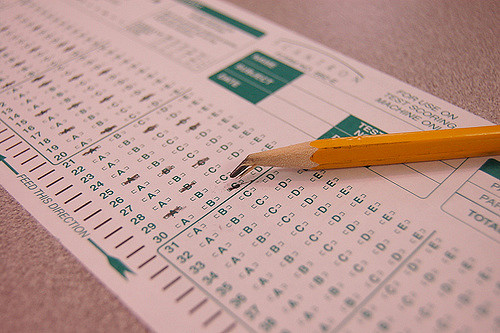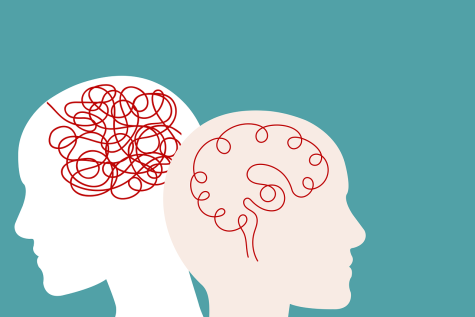The underlying stress behind testing: How do teens cope?

A bubble sheet for standardized testing alongside a pencil, photo courtesy of Josh Davis.
November 7, 2018
“When I have to take a test I feel a little stressed even if I know the subject, because so many things can go wrong,” says Maya Hing, a sophomore at the NYC iSchool. “I could forget an important detail or just not understand what the problem is asking. Besides feeling stressed, I feel anxious and just want to be done with it. After the test is done, I’ll still think about it for the rest of the day and that becomes tiring.”
Hing is no stranger to the concept of exam-based assessments or standardized testing. She recently took the PSAT, a test that prepares 9th and 10th graders for the actual SAT test that they are required to take in 11th grade. Hing took multiple state exams in elementary and middle school, and she took the U.S. History Regents Exam during her freshman year of high school to prepare her for college and future opportunities. But are they preparing her in the best way possible?
Hing isn’t completely opposed to the idea of testing, but has some suggestions for the school system to take into consideration.
“People learn differently and can show that they understand using different methods,” she stated. Since not everyone learns in the same way, she said, “I would want to have three different types of tests that we could pick from instead of just one we have to take.”
“I like when the teacher does examples and goes over it with you or the class, and explains why they are doing each step,” Hing expressed. However, not every student learns best this way, and Hing is aware of this. Some students learn best when they work on problems alone. Students are also different learners when it comes to understanding content. “One person could explain [a certain topic] really well, while another person can’t explain, but can do the problems,” Hing emphasized.
If tests did not have “only have one way to show understanding,” like Hing said, then they would be less frowned upon or anxiety-inducing for high school students. Testing is actually widespread, and Hing is not the only student who has faced the additional hardships that come with it. In the United States specifically, tests have been relied on in the schooling system since 1840.
By 1875, most oral examinations in classrooms were replaced with tests that placed more of an emphasis on writing. The first SAT tests were administered in 1926. Then, by 1930, multiple choice testing began to spread throughout schools. The school system relied so heavily on testing that the No Child Left Behind reform was created in 2001. This reform expanded the practice of standardized testing and turned it into something mandatory for all students in each state. As of now, tests have been around in the school system for over 150 years.
Tests themselves were designed to help students master specific topics and assess their knowledge on subjects, but after students have been taking them for all those years, they have expressed that tests are actually flawed in terms of living up to their purpose. When 72 students at the NYC iSchool were surveyed, nearly 81% thought that testing places more emphasis on memorizing content as opposed to bettering their understanding of a topic.
“I feel that testing altogether takes away from school. It forces teachers to teach [testing material] to them [students], and it makes students feel that to be well adequate to survive on our planet, you must be able to think fast and memorize work,” responded Dexter Pakula, a freshman at the iSchool.
Micah Gomez, a sophomore, however, doesn’t think testing only sticks to one tactic. “I feel that it’s a combination of both. For some tests it’s memorization, but for a lot of other tests, for example, English and Math, there are many problems in which the student themselves have to work out a solution and find the answers for themselves,” she said.
Regardless of your opinion on testing and what it forces students to do (whether negative or positive), it undoubtedly stresses out students. On the same survey, many of the students stated that they felt this stress due to pressure to get into a good college, high expectations of parents or guardians, and the longing to pass a certain grade or class. Academic insecurities and the competitive atmosphere in school were also major contributors to this stress that many students face.
Not only iSchool students have to deal with this testing stress. As a matter of fact, other New York City students and students all around the world have to deal with the hardships associated with testing. Alexis Fikaris, a sophomore who goes to Frank McCourt High School, felt stressed out from the results of testing, “I have been discouraged in the past by a test score because I didn’t pass a test by a few points and I felt that everyone in my grade did better than me,” she recalled.
Studying for exams also can be a stress-inducing for some students.
During the day of an exam, the stress that some students face might kick in as well. With timed testing, “students who have struggled in educational contexts in the past are likely to feel the stress most acutely.” This stress can manifest in physical symptoms, which are extremely uncomfortable for students to go through.
Ms. Colón, the guidance counselor at the NYC iSchool, believed that what happens to many students “almost resembles a panic attack.” She noted that when a student feels pressure on the day of an exam, usually “the student is breathing very heavily, they feel very overworked and overstimulated because they’re very nervous,” then concluding that those symptoms are “definitely coming from their anxiety.” However, panic attacks are not the only way that examination fear manifests itself in students.
Some students try to temporarily avoid exams by doing things such as “going to the bathroom,” according to Ms. Colón. They might stay in the bathroom for long periods of time or just go frequently in order to avoid the fear and responsibility that they mentally associate with testing. She stated that students “might actually show physical symptoms which can manifest as vomit or diarrhea,” which would cause them to go to the bathroom for other anxiety-related purposes.
During her time as a guidance counselor, she’s definitely familiar with the fact that test stress is headache-inducing for a lot of students. The reason why these students get these headaches is because the entirety of the testing process is “because it’s just too much,” in her own words. Since “they’re overthinking it, they’re so worried about it,” meaning they’re so anxious about the testing process, this tends to cloud their mind, eventually leading to stress related tension.
On the day of a test, many teens feel like trying to avoid the exam altogether. Tanay Hudson, a psychotherapist who specializes in community mental health, made the point that failing is one of the biggest fears among teenagers. “They are so scared of failing because of what a passing grade means. If it’s just a final or a midterm, the grade plays a big part in whether you pass the class or not,” commented Hudson.
Since there is a possibility of failure, many students would rather get out of the situation entirely instead of being told that their performance when trying is lackluster. “I’ve seen kids just not go. I’ve seen teenagers miss Regents… and that’s a major exam. ‘You know, I’m just going to fail, so I didn’t go,’” Hudson recalled. She believes that the reason for this is that “seeing that failing grade just has an effect on you mentally. It’s just a feeling that nobody wants to experience. It’s a feeling of disappointment, of sadness, all put together.”
This statement is in fact a true one. Many teenagers view low test scores as indicators of unintelligence or incapability. It may not seem tough, but trying to differentiate a test score from your own self-worth as a student is definitely not a simple thing for many people to do.
Since a bunch of time and effort is put toward testing in classes, the relevance of this test score seems to be much greater than it is in actuality. Students usually feel like a single grade on a test that they get accurately measures their understanding, however, this is not always the case. Alexis, when discussing how well testing displays the understanding of her and her peers, stated that she feels that it is “represented in our test scores.”
On the other hand, Mr. Fitts, a math teacher at the iSchool, believes testing is “not always” accurate when it comes to demonstrating how well a student knows something.
Relating to what Maya said earlier, everyone learns differently. Mr. Fitts gave an example of this when he recollected on his experience as a math teacher: “Some students overperform, they test really well but might not understand the material as well as one of the students that underperform,” he stated.
Certain variables, aside from stress, have control over how well a student performs on exams. These variables often don’t play much of a part in a student’s performance doing regular classwork, so it’s only natural for there to be a difference in terms of scores for people who feel comfortable in different environments.
Some of these variables include the atmosphere of the classroom that students are testing in. “The learning environment and the proctor impact your scores a lot because if you work best in a quiet environment, but the people around you are too loud that would lead to you probably not doing that well,” stated Hing. This is indeed true. Overall, school performance is heavily based on the learning environment that students have to cope with, which is made apparent through one of Google’s tools called the Public Data Explorer.
In 2011, when The American Sign Language and English Dual Language School is compared to Beacon High School, Bayside High School, and A. Philip Randolph Campus High School in terms of performance, The American Sign Language high school ends up scoring the highest – 17.5 points. When you check the rating of each of those school environments, you can see that it [The ASL School] comes in first place as well. This is because factors like school setting and peer attitudes (factors that students cannot control) very often impact the way students score on tests, which shows that that exams aren’t a completely accurate measure of a student’s abilities.
Tests have been proved to have bias in the past against certain groups of students too. “Many studies have shown that they’re not the most accurate way to assess students and that it’s very discriminatory against students of color and low-income students,” noted Ms. Guzman, another math teacher at the iSchool. This bias has been ingrained in the school system for a very long time, even in middle and elementary schools. Tanay Hudson is aware that cultural prejudice is a main influencer behind the fact that “a lot of parents opt out of their children taking state tests.”
Cultural bias, income related bias, and issues involving the learning environment a student tests in (or studies for a test in) are not the only factors that take a toll on student’s test scores that are out of their control. Financial issues can limit the amount of preparation students get for testing. This means that even if test grades aren’t reduced based on things teens cannot change by scorers, the amount of material they’re exposed to while studying for said exam varies based on how much money they have to afford for test-prep programs.
Ms. Colón feels very passionate College Board’s exams: “I have a real big problem with the ACT and the SAT because they’re paid. All the components in terms of students ‘preparing’ for these tests involve more money too… and then, to have your test scores sent to colleges I think they’re a for-profit organization, and it actually makes me sick,” she stated. Students don’t have control over their family’s financial state, so unlike regular testing, testing impacted by the amount of time spent studying using programs not everyone has access to is obviously an inaccurate measure of everybody’s understanding.
When Roseangel Pacheco, who’s now attending a college in Rochester, described her thoughts on the SAT, she stated, “I despised it.” Pacheco continued, saying, “it was annoying, as the test only shows your capability to take a test, not what you have been taught in school. We also have companies that we pay to have sessions with in preparation for the SAT when the schools curriculum should be enough.”
In the iSchool, students are graded using a mastery policy that judges students based on mastery (understanding of a topic), and productivity (completion of work). Ms. Leimsider, the assistant principal of the iSchool, stated, “I feel lucky that I work in a school that sees teaching and learning as much more than just passing standardized exams.” Although this mastery policy isn’t perfect and some students feel that it could be improved, as noted from a couple of responses on the survey, the fact that test scores aren’t always accurate is definitely proven to students much more than the curriculum in other high schools does.
It’s fine for testing to be incorporated in classrooms for teaching purposes, but only in an unbiased way. The SAT and other exams funded by the College Board or major organizations need to make test-prep more accessible to the entirety of the public for the actual tests to be deemed as an accurate form of student assessment.
Testing in general can be beneficial in certain situations, however, it proves to be ineffective and more of a frustrating thing when given to students frequently. When 72 iSchool students were surveyed, only 18.1% of them said that they didn’t feel like testing takes away from valuable time that could be spent learning about a subject as opposed to studying content that students already know about.
According to the U.S. global education rankings, “from 2002-2009, the US went from being ranked 18th in the world” when it came to math, to dropping down to the rank of “31st in the world” after more emphasis was added to standardized testing. Instead of forcing increased amounts of testing on students, the school system should make students test on occasion and incorporate alternative methods of assessment into the high school curriculum.
The media can provide teachers with helpful alternatives to testing, because certain software programs can “passively record” answers given by students so that teachers can view a student’s performance without making them stop learning because of a test. Certain games can improve a student’s skills too, because they allow people to grow as learners while having fun and being relaxed at the same time.
Portfolio-based assessments prove to be accurate ways to measure the knowledge of a class, because they evaluate a student’s understanding of a certain topic over a period of time by looking at multiple pieces of work, as opposed to one that might not reflect their skills properly.
Some people, like Ms. Leimsider, believe that testing should be student specific too. “Something that works for one student doesn’t always work for another,” she remarked, which is definitely true.
Everyone has their own way of learning. “I find that I learn best when I take handwritten notes with pens and papers as writing down information helps me memorize important information that I might have to refer back to at a later date,” said Arianna Pacheco, Roseangel’s younger sister who is a sophomore attending the iSchool.
While the practice of testing is very flawed but still enforced on students, that doesn’t stop students from finding their own ways to study or battle any academic injustices. “You have to figure out what kind of study habits help you, because if you’re uncomfortable while you’re studying, or distracted, or you’d rather be doing something else in that moment, it’s not going to work,” stated Hudson.
As for the testing stress that students take, there are various coping mechanisms that might help or lessen the anxiety. Mr. Fitts suggests practice, noting that the more you study, “the less stressful it [testing] becomes.”
Ms. Colón agrees. “Certainly, nothing can top being prepared. Sometimes students feel testing anxiety, because they genuinely aren’t ready for it, and you can’t fix that the moment before the test happens,” she stated. With practice, students will feel a heightened sense of self-assurance in terms of testing, even if they still fear failure due to their knowledge of what they’re being tested on.
Even though practice is helpful, make sure not to overdo it. “Do not study for more than two hours,” Hudson insisted. Over-studying can lead to stress and students tend to do this often as she noticed from many of her clients. When asked what students should do, she stated “definitely be rested, and don’t cram either.” In order to feel less stressed about a major test and achieve better results, she recommended this to students: “Give yourself at least a week and a half to two weeks to grasp it [what you’re studying]… and eat some carbs.”
As for teachers, they need to try their best to hear students out on any problems they have and guide them through the topics being taught in class. The teachers assess students during each lesson, so their explanations and guidance can provide comfort for those battling with testing stress. Test administrators are working on improving exams, and the school system itself is always undergoing adjustments since it changes based on feedback from the public, so it’s important for parents and teens to continue making their voices heard when it comes to the injustices of standardized testing.
Positive grades might not seem like they hold lots of value, but in reality, many students take academics seriously. However, even though the feeling of happiness from passing is extraordinary, when it comes down to it, the feeling of completion is one many students treasure. Above any of the feelings associated with test results, this feeling of completion reigns supreme.
This is definitely apparent in Hing’s statement; one that many students can relate to – “I’d feel relieved [after I finished an exam], because that means that the test is done.”











